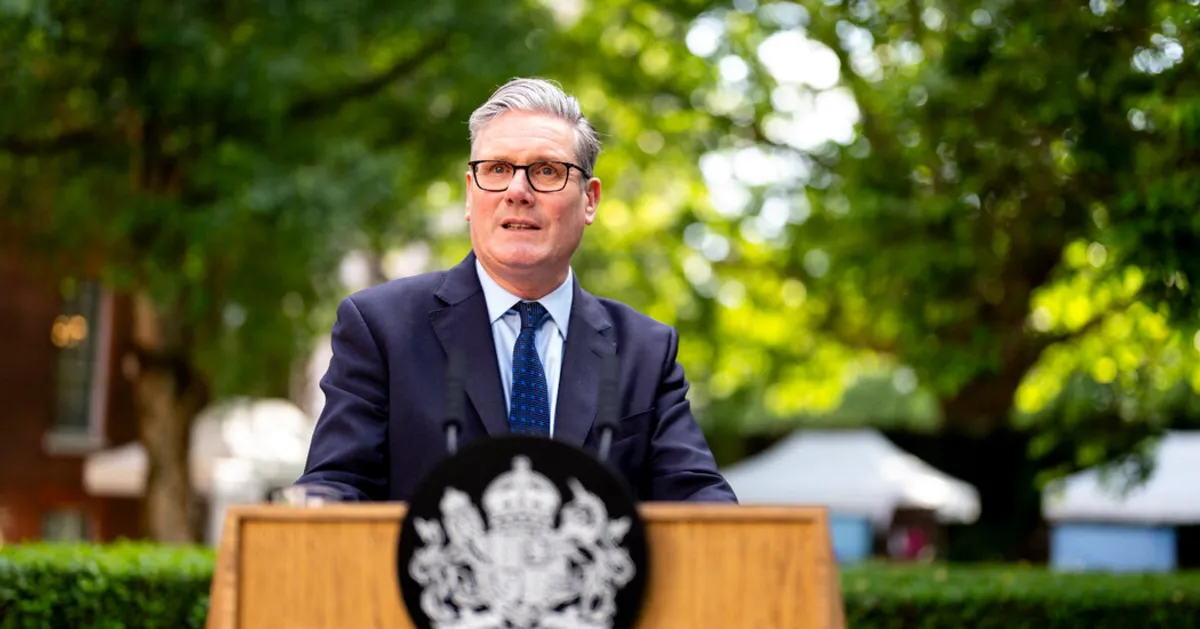
On Tuesday, Prime Minister Keir Starmer revealed that the United Kingdom would officially recognize the state of Palestine in September, contingent upon Israel's agreement to a cease-fire with Hamas. This decisive move aims to increase pressure on the Israeli government to cease hostilities that have pushed Gaza to the brink of famine. Starmer's announcement, made following an emergency cabinet meeting, marks a notable shift in his stance, reflecting the growing political pressure his government faces as public sentiment and lawmakers within his own Labour Party respond strongly to distressing images of starving children in Gaza.
Starmer positioned the recognition of Palestine as part of a broader European initiative to end the ongoing conflict between Israel and Hamas, which has persisted for nearly two years. He emphasized that Hamas must take crucial steps, including the release of remaining hostages, agreeing to a cease-fire, and acknowledging that it will play no role in governing Gaza. However, Starmer's announcement clearly targets Israel, highlighting the rapid shift in sentiment among Western nations regarding the conflict.
Following Starmer's declaration, Britain joins France, which last week announced its intention to recognize a Palestinian state at the upcoming United Nations General Assembly in September. In addition to advocating for a cease-fire, Starmer insisted that the Israeli government must commit to not annexing the occupied West Bank and engage in a peace process aimed at establishing a Palestinian state alongside Israel. These conditions are unlikely to find favor with Prime Minister Benjamin Netanyahu and his right-wing administration, which views a Palestinian state as a potential threat.
In response to Starmer's announcement, Netanyahu condemned the UK’s stance on social media, accusing the British government of rewarding what he termed “Hamas’s monstrous terrorism” while punishing its victims. He warned that the establishment of a jihadist state on Israel's border could pose future threats to Britain. Netanyahu characterized appeasement towards terrorist organizations as a strategy that ultimately fails.
Britain's decision to recognize Palestine is poised to deepen Israel's diplomatic isolation, particularly following its abandonment of a truce with Hamas earlier this year and the resumption of military operations in Gaza. This recognition carries significant symbolic weight, considering Britain's historical role in the establishment of Israel and its longstanding diplomatic ties with the United States.
Previously, Starmer had hesitated to support Palestinian statehood, perceiving it as a "performative" gesture that might complicate cease-fire negotiations between Israel and Hamas. However, escalating humanitarian crises in Gaza, exacerbated by Israeli restrictions on food deliveries, influenced his decision. Over 250 lawmakers, including many from Labour, urged Starmer to take action at the upcoming UN conference aimed at promoting a two-state solution.
Critics of Britain’s recognition of Palestine argue that statehood should not be used as a bargaining chip. Some experts believe that this approach may not alleviate the humanitarian crisis in Gaza and could undermine Britain's negotiating leverage with Israel in the future. Aaron David Miller, a former peace negotiator, described the recognition as a form of “virtue signaling,” suggesting it could limit Starmer's influence in the ongoing situation.
During his address at the UN conference, Foreign Secretary David Lammy invoked Britain’s historical role in the creation of Israel, referencing the Balfour Declaration of 1917 and the ongoing injustices faced by the Palestinian people. Lammy noted that the UK has already suspended some arms sales to Israel and imposed sanctions on certain Israeli ministers. Despite these measures, the pressure on Starmer to act has intensified, with cabinet members advocating for a clear stance on the Palestinian recognition.
In recent days, the UK has taken steps to provide humanitarian aid to Gaza, including airlifting supplies and evacuating injured children to British hospitals. Starmer has appealed to international partners, including former President Trump, to facilitate increased humanitarian aid to the region. “We will continue to work with all our international partners to end the suffering and deliver a more stable future for the Middle East,” he stated, acknowledging the urgent needs of the British public for action.
For Starmer, whose background includes a career in human rights law, the heartbreaking scenes emerging from Gaza signify a pressing need for action. He expressed his deep concern over the humanitarian crisis, stating, “Now, in Gaza, because of a catastrophic failure of aid, we see starving babies and children too weak to stand — images that will stand with us for a lifetime.” His emotional response underscores the gravity of the situation and the urgency for international intervention.